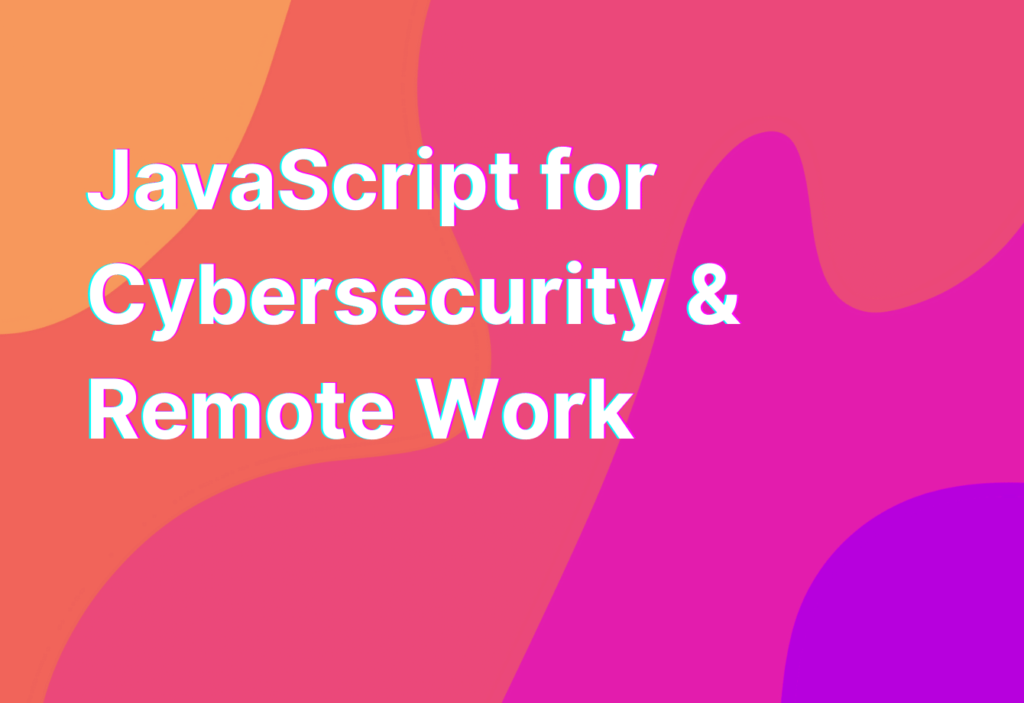JavaScript for Cybersecurity & Remote Work
Hey there, remote work enthusiasts! It’s Ashley here, your friendly remote work advocate with another informative blog post. Today, we’re diving into the world of JavaScript and how it plays a crucial role in cybersecurity for remote work. So grab your favorite cup of coffee and let’s get started!
What is JavaScript?
JavaScript, often abbreviated as JS, is a programming language that allows developers to add interactivity and dynamic features to websites. It is widely used for both front-end and back-end development, making it an essential tool for web developers.
Now, you might be wondering, what does JavaScript have to do with cybersecurity and remote work? Well, my friend, let me tell you!
JavaScript and Remote Work Security
When it comes to remote work, security is of utmost importance. As remote workers, we often handle sensitive data and communicate through various online platforms. This is where JavaScript comes into play.
JavaScript is used to enhance the security of remote work by implementing various cybersecurity measures. Let’s take a look at some of the ways JavaScript helps protect us:
- Client-Side Validation: JavaScript allows developers to validate user input on the client-side before sending it to the server. This helps prevent malicious data from being submitted and protects against common cyber attacks like SQL injection and cross-site scripting.
- Encryption and Decryption: JavaScript provides libraries and APIs that enable developers to encrypt and decrypt data. This is crucial for securing sensitive information, such as passwords and personal details, during transmission.
- Authentication and Authorization: JavaScript frameworks like Node.js allow developers to implement robust authentication and authorization systems. These systems ensure that only authorized individuals can access sensitive data and perform certain actions.
- Secure Communication: JavaScript enables the use of secure communication protocols, such as HTTPS, for transmitting data over the internet. This ensures that data is encrypted and protected from interception by unauthorized parties.
- Security Auditing: JavaScript can be used to perform security audits and vulnerability assessments on web applications. By analyzing the code and identifying potential weaknesses, developers can proactively address security issues.
As you can see, JavaScript plays a vital role in safeguarding our remote work environment. It helps protect our data, secure our communications, and ensure that only authorized individuals have access to sensitive information.
JavaScript and Cybersecurity Trends
Now that we understand the importance of JavaScript in remote work security, let’s take a look at some interesting cybersecurity trends related to JavaScript:
- Increased Use of JavaScript Frameworks: JavaScript frameworks like React, Angular, and Vue.js have gained immense popularity in recent years. However, with increased usage comes increased security risks. It’s important for developers to stay updated with the latest security practices and regularly patch vulnerabilities in these frameworks.
- Client-Side Attacks: As more functionality is shifted to the client-side, attackers are finding new ways to exploit JavaScript vulnerabilities. Cross-site scripting (XSS) attacks, for example, target the client-side code to inject malicious scripts into web pages. It’s crucial for developers to implement proper input validation and output encoding to prevent such attacks.
- Secure Coding Practices: With the growing importance of cybersecurity, organizations are placing a greater emphasis on secure coding practices. Developers are encouraged to follow best practices, such as input validation, output encoding, and secure storage of sensitive data, to minimize the risk of security breaches.
These trends highlight the evolving nature of cybersecurity and the need for continuous learning and adaptation in the field of JavaScript development.
Wrapping Up
And there you have it, folks! JavaScript is not only a powerful programming language for web development but also a crucial component of cybersecurity in the remote work landscape. From client-side validation to secure communication, JavaScript helps protect our data and ensure a safe remote work environment.
If you’re interested in learning more about cybersecurity and remote work, be sure to check out our article on Keystroke Dynamics. It’s a fascinating topic that explores how our typing patterns can be used for enhanced security.
Stay safe, stay secure, and keep embracing the remote work revolution!


